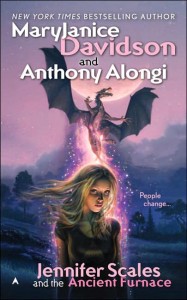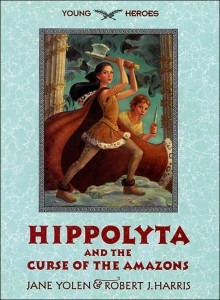
 When Jennifer’s parents gave her the usual “birds and bees” speech, they managed to leave out the part where the otherwise normal teenager would someday start growing scales, claws, fangs, and a tail, and be able to perform superhuman feats of strength and agility. So when the changes start to occur, they really throw Jennifer for a loop, especially since this upheaval in her life is wreaking havoc with her social, academic, and athletic lives. When it’s finally explained that Jennifer is one of a long line of weredragons (like her father), part of a hidden community that dwells amongst and alongside regular humanity, it’s not the most reassuring thing Jennifer ever could have heard. Now she has to contend with being a dragon for several days out of every month! Worse still, Jennifer’s displaying a wide mixture of powers, where most dragons concentrate upon one specific aspect of their being. So not only is she a monster out of myth, she’s a freak even among her own kind.
When Jennifer’s parents gave her the usual “birds and bees” speech, they managed to leave out the part where the otherwise normal teenager would someday start growing scales, claws, fangs, and a tail, and be able to perform superhuman feats of strength and agility. So when the changes start to occur, they really throw Jennifer for a loop, especially since this upheaval in her life is wreaking havoc with her social, academic, and athletic lives. When it’s finally explained that Jennifer is one of a long line of weredragons (like her father), part of a hidden community that dwells amongst and alongside regular humanity, it’s not the most reassuring thing Jennifer ever could have heard. Now she has to contend with being a dragon for several days out of every month! Worse still, Jennifer’s displaying a wide mixture of powers, where most dragons concentrate upon one specific aspect of their being. So not only is she a monster out of myth, she’s a freak even among her own kind.
As Jennifer continues to learn about the secrets of her heritage, spending time with other young weredragons and hearing the old stories from her grandfather, she slowly realizes just how changed her world really is. And she learns about the deadly enemies of her kind: human hunters called beaststalkers, and were-spiders, who also dwell in secret. As evidence mounts that both were-spiders and beaststalkers have infiltrated even the closest aspects of her life, Jennifer is forced to fight for her life and call upon previously-unknown abilities. And what does the legend of the Ancient Furnace have to do with everything that’s going on?
Best known for her romantic comedies involving vampires and werewolves, MaryJanice Davidson teams up with her husband here to deliver the first in a new series, and they get things rolling with a fairly strong start. While much of Jennifer Scales and the Ancient Furnace is dedicated to setup and exploration of the series’ premise, it still offers a good, entertaining story filled with some intriguing turns and surprises. As concepts go, it’s relatively underutilized, and still feels fresh, giving off a Buffyesque vibe. Jennifer is a good, strong character with a lot of potential, and I look forward to future offerings in this series.












